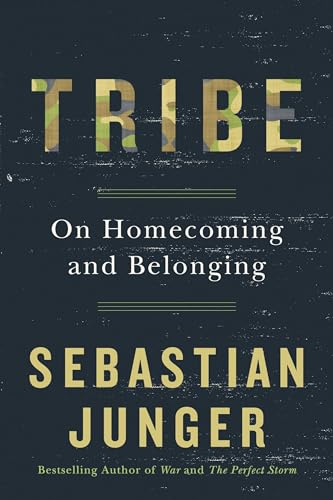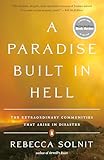
“I do miss something from the war,” Bosnian journalist Nidzara Ahmetasevic tells Sebastian Junger halfway through his new book, Tribe: On Homecoming and Belonging. Ahmetasevic is talking about the wartime closeness she shared with friends in a basement bomb shelter in besieged Sarajevo. “The love that we shared was enormous,” Ahmetasevic says. “I missed being close to people, I missed being loved in that way.”
The sentiment lies at the heart of Tribe, a book offering a surprising thesis about the ways humans have traded communal belonging for excessive safety.
Junger gets a considerable amount done in a quick 133 pages: Tribe posits a reason why white settlers found life among Native American tribes appealing, theorizes about false PTSD claims among returned U.S. veterans, and conveys the author’s equality-minded view of how heroic behavior varies between genders — all in addition to remarks on hitchhiking, attachment parenting, Junger’s dad’s opinion of military service, and more. It’s an awful lot of ground to cover in such a short book, and it’s inevitable that Tribe would either feel inchoate and sketched or else aggravatingly dense. Because Junger is an adventurous storyteller (rather than, say, an academic theoretician), he opts for the former.
It’s not necessarily a good thing. The book’s lightness makes it accessible, an easy entry point to weighty subject matter. But its concision can make Tribe feel breezy even as it discusses life and death — if not outright incomprehensible.
Tribe is essentially a critique of modern civilization, beginning with Junger’s observation of the inexorable appeal of Native American lifeways to early settlers (“The intensely communal nature of an Indian tribe held an appeal that the material benefits of Western civilization couldn’t necessary compete with”). It proceeds through an examination of how disastrous or violent circumstances can create similar human closeness, and includes a discussion of how our society’s distancing itself from such harsh conditions has inadvertently sharpened those events’ capacity to traumatize the people who endure them.


 All of these points have been covered in other, heavier books. Jared Diamond’s The World Until Yesterday examines traditional tribal lifestyles’ usefulness in the present day. The entanglement of war with human closeness and purpose is the focus of Chris Hedges’s War Is a Force That Gives Us Meaning. (Both Hedges and Junger include the same anecdote, in fact, about a teenage couple in besieged Sarajevo, that dies, sniper-shot, on the banks of the Miljacka River.) Junger also briefly mentions the work of seminal disaster researcher Charles Fritz, noting that Fritz could find almost no examples of mass panic during large-scale disasters. This plays into his overarching point that difficult experiences can be unifying rather than shattering. The exact same studies by Fritz and fellow researchers — and that exact same, crucial point — are detailed in Rebecca Solnit’s brilliant A Paradise Built in Hell.
All of these points have been covered in other, heavier books. Jared Diamond’s The World Until Yesterday examines traditional tribal lifestyles’ usefulness in the present day. The entanglement of war with human closeness and purpose is the focus of Chris Hedges’s War Is a Force That Gives Us Meaning. (Both Hedges and Junger include the same anecdote, in fact, about a teenage couple in besieged Sarajevo, that dies, sniper-shot, on the banks of the Miljacka River.) Junger also briefly mentions the work of seminal disaster researcher Charles Fritz, noting that Fritz could find almost no examples of mass panic during large-scale disasters. This plays into his overarching point that difficult experiences can be unifying rather than shattering. The exact same studies by Fritz and fellow researchers — and that exact same, crucial point — are detailed in Rebecca Solnit’s brilliant A Paradise Built in Hell.
 Junger uses these insights towards another point. “Because modern society has almost completely eliminated trauma and violence from everyday life, anyone who does suffer these things is deemed to be extraordinarily unfortunate,” he writes. “This gives people access to sympathy and resources but also creates an identity of victimhood that can delay recovery.” This is an important observation. It, too, resonates quite closely with previous work — in this case Harvard psychiatrist Judith Lewis Herman’s seminal book Trauma and Recovery, which remarks that “to hold traumatic reality in consciousness requires a social context that affirms and protects the victim and that joins victim and witness in a common alliance.”
Junger uses these insights towards another point. “Because modern society has almost completely eliminated trauma and violence from everyday life, anyone who does suffer these things is deemed to be extraordinarily unfortunate,” he writes. “This gives people access to sympathy and resources but also creates an identity of victimhood that can delay recovery.” This is an important observation. It, too, resonates quite closely with previous work — in this case Harvard psychiatrist Judith Lewis Herman’s seminal book Trauma and Recovery, which remarks that “to hold traumatic reality in consciousness requires a social context that affirms and protects the victim and that joins victim and witness in a common alliance.”
What Junger achieves, then, is to assemble parts of all those books into one slim volume. So much the better for the busy reader. Unfortunately, Junger’s quick look at violence, trauma, and modern anomie also omits important information from other books, and as a result ends up on shaky ground, failing to consider counterpoints or bring its own arguments to a close.
Part of the takeaway from this book is that regarding military service as a source of permanent psychiatric disability is incorrect for most soldiers. Junger includes a lengthy discussion of how the U.S. Veterans Administration mishandles former soldiers’ mental health issues, and how America’s cultural misunderstanding of war plays into that deleterious milieu. The information isn’t wrong per se, but what it has to do with the rest of the romanticizing of foregone tribal lifeways, etc., or why that necessitates anything more than the 2015 Vanity Fair article from which the book sprung is never quite made clear. Worse, Junger says that the low rate of combat engagement among U.S. soldiers means their diagnoses of post-traumatic stress disorder often aren’t real — but he fails to consider that some soldiers develop PTSD from military sexual trauma, or from other adverse experiences outside of combat or before their enlistment.
Worse, he seems to misunderstand the diagnosis entirely. Here, as in the Vanity Fair article, Junger describes his own bout with what he calls “classic short-term PTSD,” departing from this insight to further dissect trauma and the ways modern society misunderstands it. The problem is, there really is no such thing as “short-term PTSD.” It sounds like what Junger had was post-traumatic stress, a weeks- or months-long psychological adaptation to adverse events (in his case, exposure to war) that typically resolves on its own. Although psychological care can sometimes be relevant, most mental health professionals don’t regard this as an illness. (Tellingly, Junger’s approach to his diagnosis involved little more than an acquaintance’s ad hoc comment at “a family picnic.”) Post-traumatic stress disorder is only diagnosable after three to six months, does not often go away on its own, and can endure for a lifetime if untreated. The implication that Junger’s case is typical PTSD is misleading — and to some extent, calls his conclusions into question.
The problems in his argument go even deeper. “In Bosnia — as it is now — we don’t trust each other anymore; we became really bad people,” Ahmetasevic tells Junger. “We didn’t learn the lesson of the war, which is how important it is to share everything you have with human beings close to you.” Junger’s thesis is that other cultures (the “Stone-Age tribes” white settlers once joined) did learn that lesson. But he assumes that violence is innate to humans and necessary for human closeness, never parsing evidence that it is not. And he doesn’t examine what this Bosnian journalist means by “really bad,” and how becoming so after the war might have arisen directly from the painful, long-lasting effects of the severe trauma Junger doesn’t quite seem to believe in.
He does argue that collective dissatisfaction with our “society that is basically at war with itself” should lead to a large-scale rearrangement of our lives and lifestyles. (“I also believe that the world we are living in — and the peace that we have — is very fucked up if somebody is missing war,” Ahmetasevic offers.) In a time of impending ecological disaster, that’s worth considering. Junger’s point about encouraging stronger communities and more human closeness is a good one. But this half-baked, too-brief book, so scattershot that its message is hard to ascertain, won’t get us there.









